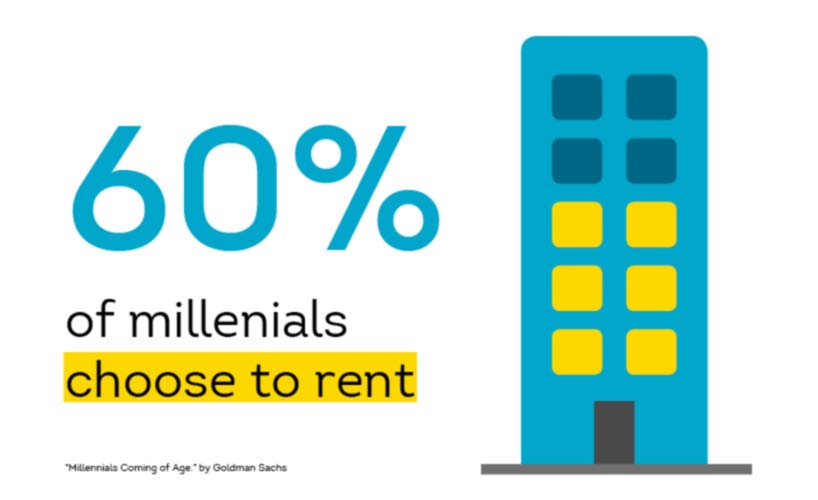Disclosure:
Remember that this material is intended to provide you with helpful information and is not to be relied upon to make decisions, nor is this material intended to be or construed as legal advice. You are encouraged to consult your legal counsel for advice on your specific business operations and responsibilities under applicable law. Trademarks used in this material are the property of their respective owners and no affiliation or endorsement is implied.
According to The Washington Post, the millennial generation is now the largest in history. In fact, CNN reports that millennials outnumber baby boomers by 11 million. The Brookings Institution gives the statistic that millennials will comprise more than 1 in 3 adult Americans by 2020.
This generational shift is having an impact in all sectors of our economy, including the market for rental properties and housing in general. Therefore, it’s important for landlords to understand the values of younger Americans, trends in millennial renters and why they choose to rent over buying their first home.
Background of Millennials
The Pew Research Center defines millennials as those born between 1981 and 1997, making them 18 to 34 in 2015. According to NPR, millennials are the most educated generation, but the stigma of being overeducated and underemployed isn’t valid. NPR reports that two thirds of millennials over the age of 25 are not college graduates, and that their peers with college degrees earn, on average, $17,500 more annually.
Growing up in an era of rapid change, millennials have vastly different priorities, expectations, and values than those of prior generations. According to research on millennial behaviors conducted at the New Jersey Institute of Technology, this is a generation of digital natives and multitaskers. They prioritize flexibility and convenience, and prefer to keep their options open. Millennials value work-life balance, and refuse to sacrifice their health or leisure time, even for higher salaries.

The Brookings Institution identifies the key millennial values shaping the economy:
- Experiences hold more importance than acquiring material possessions.
- A desire for their work to reflect larger societal concerns.
- An emphasis on ethical causes and the environment, with a stronger brand loyalty towards corporations that specifically address social problems.
- A preference towards building communities around shared interests rather than geographic proximity.
Maturing Millennials
Younger Americans are staying in the rental market through their 20s and mid-30s. U.S. News reports that many millennials are delaying life decisions that commonly precede buying a home, such as marriage or starting a family. Recent studies by the Pew Research Center show that the tough economy has impacted young Americans the most, and that adulthood starts later than it used to.
68% of young adults feel they don’t have the resources to live the kind of life they want, and about a third of millennials still live with their parents. Unemployment, lower earnings, and slow wage growth contribute to this trend. Despite the Bureau of Labor Statistics report that the national unemployment rate dropped to 4.8% at the beginning of 2017, according to Generation Opportunity millennials face a 12.8% unemployment rate and are struggling to find good jobs.
Millennials are also more likely than previous generations to be shouldering large student loans, meaning that it takes longer to save for a down payment on a house. In fact, 40% of people rent because the cost of a down payment makes it too difficult to buy their own home. These are likely the reasons millennials are choosing to rent past the age when Americans typically begin investing in homes.
Renting to Millennials
Perhaps most important for landlords is the Goldman Sachs statistic that 60% of millennials choose to rent, and Zillow reports that they are the most willing to move into an apartment building.

Since millennials are so tech-savvy, it’s not surprising to learn that 90% of millennial renters use technology to search for a new home. Three out of four do so via their mobile device. They also tend to contact more landlords on average than renters of other generations. Older millennials contact 5.3 landlords on average, compared to an overall average of 4.7.
According to a Rent.com survey, millennials are a generation of renters for several reasons. There are rental property characteristics and amenities that they are looking for when they choose a place to live. The majority surveyed ranked affordability as a top reason for renting, likely due to the same financial constraints that have caused them to put off marriage and children. However, renting also speaks to two of the top values of the millennial generation: flexibility and convenience. They appreciate the freedom to move on to new neighborhoods when their lease is up. Additionally, when something goes wrong, they don’t have to be the ones to deal with home maintenance.
Zillow states that the majority of renters are in it for the long haul, and this is especially true for younger renters. 62% of millennials that plan to move in the next three years signaled they will look for another rental property.
FICO reports that millennials tend to have more delinquent payments and shorter credit histories than other age groups, with 28% of millennials scoring in the 300-579 score range. Since a low credit score will generally predict higher likelihood of a bad rental outcome such as late or delinquent payments, this is a good reminder to landlords to always check tenant credit report with SmartMove. A thorough tenant screening process, including checking tenant history for criminal, landlord credit checks and past evictions, is a critical way to assess whether your prospective tenant will pay rent on time.
![The Anatomy Of A Millennial Renter [INFOGRAPHIC]](/blog/anatomy-millennial-renter-infographic/_jcr_content/root/pagesection_132356844/columnrow/item_1682370731956/contentcontainer/image_680986317.coreimg.png/1688612068315/anatomy-of-the-millennial-renter-infographic.png)
Conclusion
According to the Joint Center for Housing Studies of Harvard University, rental demand is projected to remain high over the next decade as the youngest members of the millennial generation begin to form their own households.
NerdWallet points out that it would take a typical millennial 6 years to save for a 6% down payment on a starter home. Additionally, Zillow research shows that home values have risen faster than incomes. With these factors in mind, it’s not far-fetched to estimate that the rental market will continue to favor landlords for at least the next decade.
Since a study from Pew Research Center now confirms that millennials are the largest generation in America. To help landlords understand the habits and preferences of this up and coming group, we’ve created a quick guide that illustrates the anatomy of the millennial renter that helps those in the industry know what to expect.
Know your applicant.
Additional Disclosure:
For complete details of any product mentioned in this article, visit www.transunion.com. This site is governed by the TransUnion Rental Screening Privacy Policy Privacy Notice located at TransUnion Rental Screening Solutions, Inc. Privacy Notice | TransUnion.



